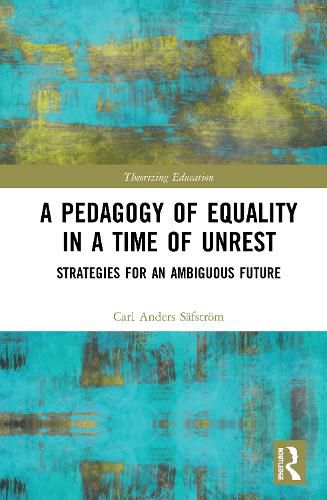Readings Newsletter
Become a Readings Member to make your shopping experience even easier.
Sign in or sign up for free!
You’re not far away from qualifying for FREE standard shipping within Australia
You’ve qualified for FREE standard shipping within Australia
The cart is loading…






A Pedagogy of Equality in a Time of Unrest addresses education and teaching as fundamental democratic forms of equality. It offers an alternative route for democracy and education and shows how particular shifts in ways of thinking and practising can lead to an education in favour of a democratic life for all.
The book identifies the distributive paradigm in education, and dismantles central aspects of such a paradigm. It revolves around the themes of equality, commitment, change, emancipation, freedom and ambiguity, all set in relation to the distinction between schooling and education. Drawing on a range of theorists such as Jacques Ranciere and Judith Butler, as well as the early Sophists, the book develops strategies to counteract any attempts to close down opportunities of emancipation through education.
This book will be of great interest to academics, researchers and postgraduate students in the fields of the philosophy of education, history of education, critical sociology of education and educational theory. It will also appeal to activists and those interested in emancipatory forms of education and pluralist democracy.
$9.00 standard shipping within Australia
FREE standard shipping within Australia for orders over $100.00
Express & International shipping calculated at checkout
A Pedagogy of Equality in a Time of Unrest addresses education and teaching as fundamental democratic forms of equality. It offers an alternative route for democracy and education and shows how particular shifts in ways of thinking and practising can lead to an education in favour of a democratic life for all.
The book identifies the distributive paradigm in education, and dismantles central aspects of such a paradigm. It revolves around the themes of equality, commitment, change, emancipation, freedom and ambiguity, all set in relation to the distinction between schooling and education. Drawing on a range of theorists such as Jacques Ranciere and Judith Butler, as well as the early Sophists, the book develops strategies to counteract any attempts to close down opportunities of emancipation through education.
This book will be of great interest to academics, researchers and postgraduate students in the fields of the philosophy of education, history of education, critical sociology of education and educational theory. It will also appeal to activists and those interested in emancipatory forms of education and pluralist democracy.